30 Blog Disclaimer Examples
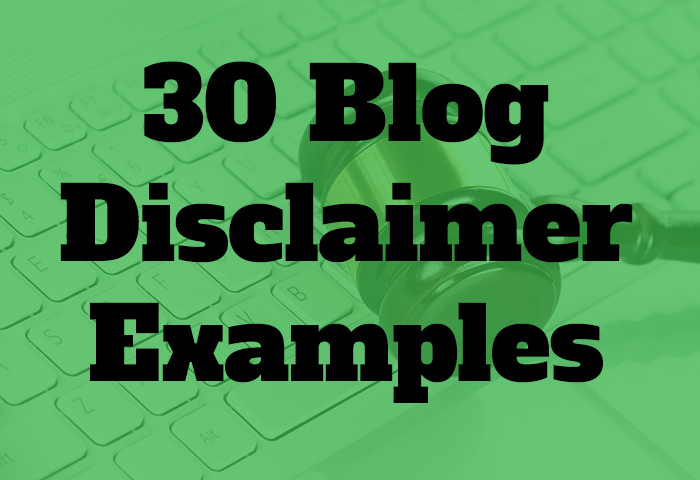
Blog disclaimers might not seem like the most exciting thing in the world but they’re incredibly important. Without a disclaimer, you could be open to potential legal issues that arise from people reading your content. While it isn’t likely that you’ll get in trouble for running a blog without a disclaimer, why take the chance? A disclaimer keeps you safe and makes your blog look more professional. There’s no downside to having one but the trick is making one that covers every area that applies to your blog. To publish the right disclaimer, read on.
What is a Blog Disclaimer?
A disclaimer includes legal information that protects you and helps your readers understand what your blog can and can’t offer. It can also include information about whether you take money from advertisers and whether you include affiliate links. Many bloggers also include a warning that the information on their site is not intended to apply to their specific situation. For example, doctors tell people that their blogs are not intended to give medical advice.
Do You Need a Disclaimer?
Yes, you definitely need a blog disclaimer. Without one, you aren’t adequately warning your readers about the content on your blog. It protects you and helps inform your readers at the same time.
Reading through blog disclaimer examples might help make it more clear why blog disclaimers are so important. It can also help you understand what kind of disclaimer your own blog needs. Some blogs that don’t include serious information that could negatively impact someone’s life don’t require a long disclaimer. On some of the other blog disclaimer samples, though, you’ll see that they’re very long and include a lot of information.
Writing a Blog Disclaimer
To write a blog disclaimer, decide what kinds of legal protection you might need and what information you want to provide to your readers. Blog disclaimers can include anything from data use policies to explanations of content validity and how things will change over time. Understanding how to write a blog disclaimer can take a little work but once you have a few drafts, you’ll have something great to add to your blog.
Of course, a blog disclaimer should be geared toward the type of content you publish, too. A blog dealing with fitness, for example, will need a different disclaimer than the blog of a person who reviews tech products. Check out the different blog disclaimer examples below to get an idea of how disclaimers differ between various types of blogs.

Legal Blog Disclaimers
Legal blogs have to be especially careful with the disclaimers they publish. People may go to the blog looking for free legal advice and then feel cheated when it doesn’t pan out. It’s very important for legal blogs to make it clear that they aren’t lawyers for every person reading the blog. In addition, they should recommend that a person with legal difficulties seek professional help outside of the Internet.
1. Open Law Lab
Open Law Lab puts its disclaimer on the blog footer so it appears on every page of the site. It explains that the site is for educational purposes and that it shouldn’t be treated as legal advice. It says to contact a professional if a reader needs help.
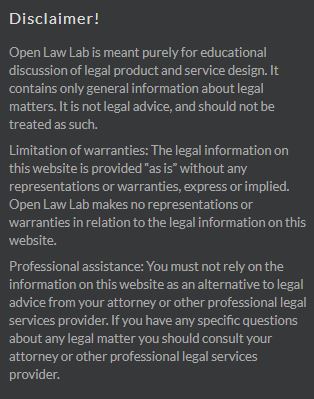
2. Fourth Amendment
The author of Fourth Amendment includes the disclaimer for the site under “Notes on Use”. They explain to the blog readers that it isn’t legal advice and then say that all the information might not be available. It also discusses updating the site and makes it clear that there’s no connection to LexisNexus.
It says:
1. LexisNexis® has no connection to this web site.
2. The use of this website does not constitute the rendering of legal advice by the author to the reader.
3. Without access to the printed book and its current paper supplement, parts of this electronic supplement may appear to or be misleading. Therefore, readers run the risk of taking something out of context.
4. Every effort is made to update this web site daily before 9 a.m. Eastern and to periodically Shepardize® the citations. As stated above in A.3.a., I have a day job and answerable to courts, clients, and other obligations. And, I try to have a life.All of this sometimes limits this website to being updated late in the day or only every other day. It happens. I can tell by usage statistics that visits really start after 9 a.m. Eastern, so that is my goal.
3. The Fashion Law
The Fashion Law publishes its disclaimer on its “Terms/Privacy” page. It explains that the site — the service — can go down, that everything is provided “as is” and that they aren’t responsible for any damages or losses. Its blog disclaimer example can be seen below.
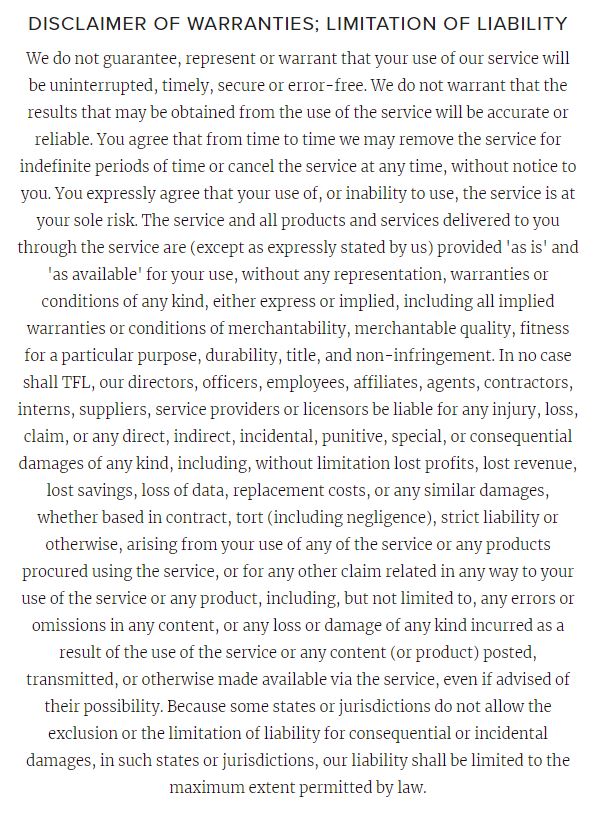
4. SociallyAware
SociallyAware has a page labeled “Disclaimer” where they explain that it’s made for general information and not to give specific legal advice to readers. They use the term “attorney client relationship” to make it clear that none exists between the readers and the authors or owners of the site. Many blog disclaimer examples for
It says:
This Blog/Web Site is made available by the lawyer or law firm publisher for educational purposes only as well as to give you general information and a general understanding of the law, not to provide specific legal advice. By using this blog site you understand that there is no attorney client relationship between you and the Blog/Web Site publisher. The Blog/Web Site should not be used as a substitute for competent legal advice from a licensed professional attorney in your state.
5. TechnoLawyer
When you click the “Terms of Use” on TechnoLawyer, it opens in a new window. They explain that no matter what’s written, they don’t guarantee that it’s true or that it’s reliavble. It repeatedly says that use of the site and materials are at the reader’s own risk.
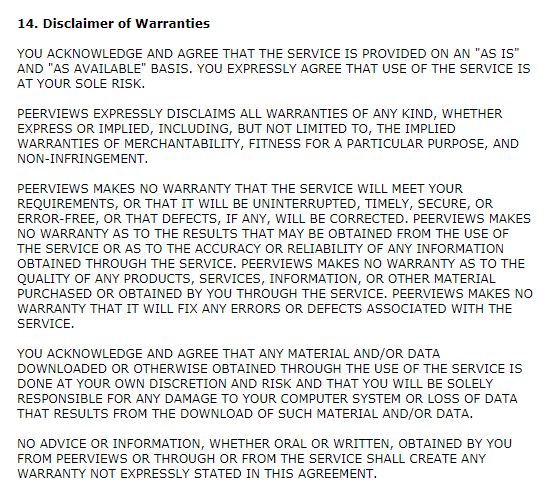
Cryptocurrency Blog Disclaimers
Cryptocurrency blogs are often written for audiences who are already invested in cryptocurrency or those who are interested in investing for the first time. Since cryptocurrency — like most investments — can go up and down quickly and unexpectedly, it’s important to make sure that people understand that from the beginning. You should also state that you aren’t giving them advice as a professional even if you are a professional. Your readers aren’t your clients. You can’t take any responsibility for what they do with the information they read on your blog.
6. Coindesk
Coindesk includes both a standard disclaimer and a disclaimer of warranty. They explain that they are not liable for losses that you may have, that they can’t guarantee their information is accurate, and that they suggest you speak to a professional for advice before you invest money in Cryptocurrency.
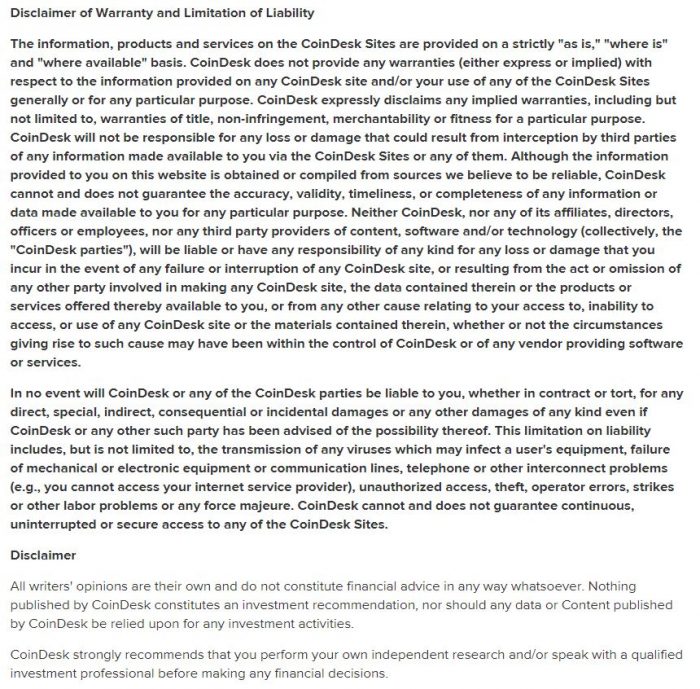
7. Bitcoinist
Bitcoinist includes their disclaimer under the “About us” section of the website. It reminds readers that they can’t guarantee the legality of various cryptocurrencies in a particular area and that they can’t guarantee or endorse claims made on the site. Its blog disclaimer example shows how disclaimers sometimes refer to other pages or sections of the site.
It says:
While Bitcoinist accepts payment to publish press releases and sponsored articles (see section titled “How Does Bitcoinist Make Money?”), we do not endorse and cannot guarantee any claims made in those content pieces.
None of the articles published on Bitcoinist should be construed as investment advice. We strongly advise our readers to always do their due diligence before investing in any cryptocurrency, blockchain project, or ICO, particularly those that guarantee profits. Furthermore, Bitcoinist does not guarantee or imply that the cryptocurrencies or projects published are legal in any specific reader’s location. It is the reader’s responsibility to know the laws regarding cryptocurrencies and ICOs in his or her country.
8. Coinspeaker
Coinspeaker includes their blog disclaimer under the “Terms and Conditions” section of the website. Unlike some of the other websites’ disclaimers, it’s written in all CAPS. It explains that a reader uses the site at their own risk and they don’t offer any warranties on the information provided.
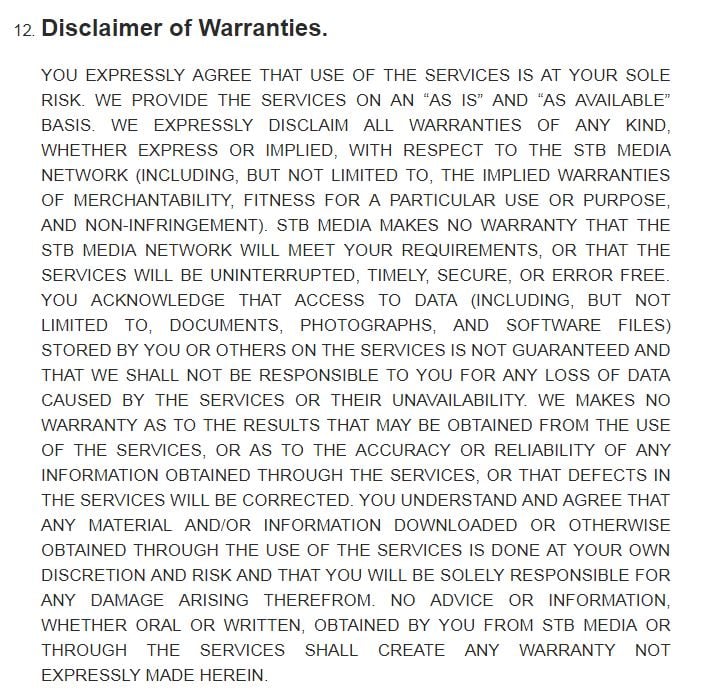
9. CoinSpectator
CoinSpectator includes their disclaimer in the “Terms of Service and Privacy Policy”. They, like many other Cryptocurrency blog disclaimers, say that use of the site is on an “as is basis” and that they can’t say whether the material is accurate.
It says:
1. The materials on CoinSpectator’s website are provided on an ‘as is’ basis. CoinSpectator makes no warranties, expressed or implied, and hereby disclaims and negates all other warranties including, without limitation, implied warranties or conditions of merchantability, fitness for a particular purpose, or non-infringement of intellectual property or other violation of rights.
2. Further, CoinSpectator does not warrant or make any representations concerning the accuracy, likely results, or reliability of the use of the materials on its website or otherwise relating to such materials or on any sites linked to this site.
10. CryptoPotato
CryptoPotato explains on their “Terms” page that the page itself is a legal document and governs the legal terms of their site. One section, entitled “Disclaimer”, shows that any information and the use of any information from the site come with no guarantees. They also explain what kind of liability they could possibly have. Unlike some other sites, they don’t recommend speaking to a professional. They say the use of the site is at your own risk.
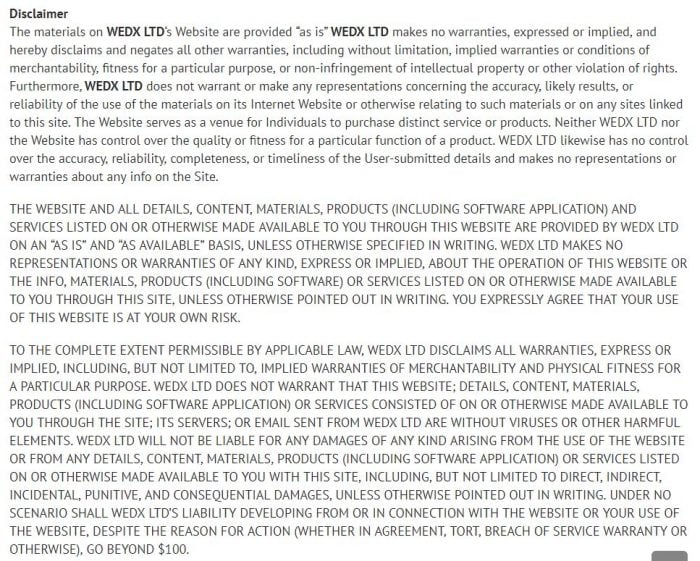
Medical Blogs
Because of the sensitive nature of the topic and the chance that people could have bad outcomes following advice read in the blog, most medical blogs have extensive disclaimers. Like lawyers’ blogs, they remind people to seek medical help and that they aren’t dispensing medical advice directly to the reader. They also usually have a section explaining that they can’t guarantee the information in the blog is accurate or current.
11. Lisa Nelson, RD
Lisa Nelson is a good example of a medical professional who isn’t a doctor. Her disclaimer reminds readers that she isn’t an M.D., that she makes no endorsements, and that the site only exists for informational purposes. She explains that testimonials don’t guarantee the same results and has a limitation of liability. Her disclaimer is very extensive and says at the end that you agree to the terms of it when you use her site.
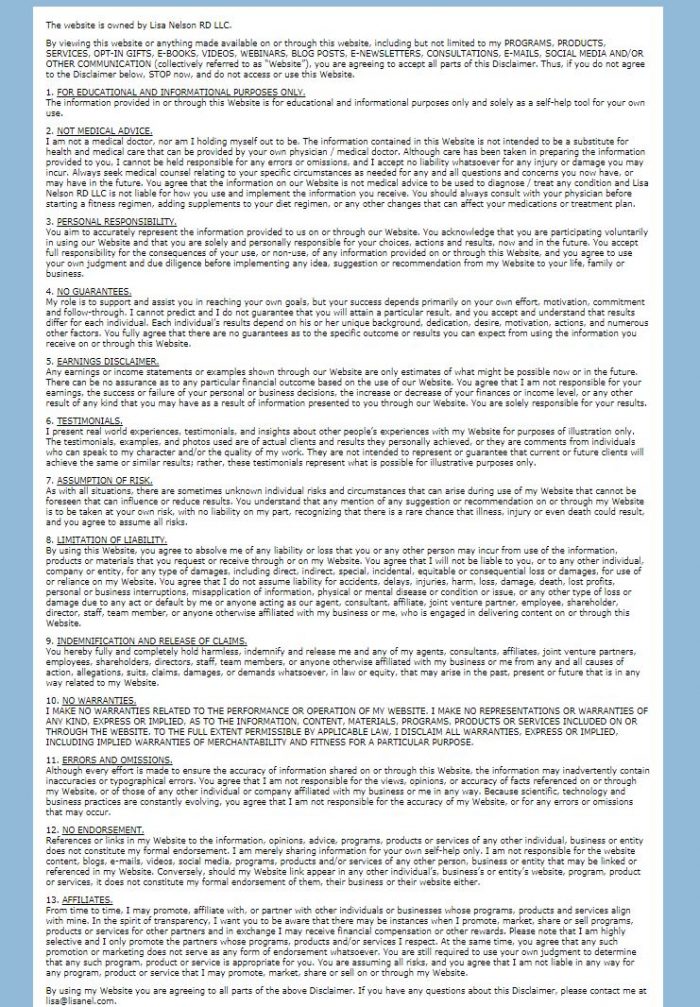
12. Emergency Dentists Blog
The Emergency Dentists Blog gives people valuable information about dental care. Like other medical blogs, it has an extensive disclaimer that explains that they aren’t a medical authority. They also make a note of their connection to a service that supplies emergency dentistry. The disclaimer says:
Thank you for visiting our site and we appreciate your patronage. We have made every reasonable effort to present accurate information on our website; however, we are not responsible for any of the results you experience while visiting our website, EmergencyDentistsUSA.com, as a result of applying the material presented on our website. We should be able to help you find an after hours dentist but we cannot guarantee the services or the quality of the dentists.
We do not possess any special medical or dentistry training and therefor do not consider ourselves a medical authority. We encourage you to conduct your own independent research. We assume no liability for your use of this website or reliance on any of the information provided.
We have employed our own due diligence in developing information for the readers of this website. We strive to provide to our readers accurate information that can help them learn more about the topics covered on the website, but we cannot take personal or legal responsibility for your use of this information. It is our sincere desire to continue to provide quality information as it relates to the subject matter reported on and covered in this website and it is our aim to provide accurate information. We cannot assure you that all of the information provided will always be accurate or up to date, nor can we take responsibility for your use of this information.
We present the information at our website in an effort to assist your research efforts. If we make any comments or observations that are taken in offense by an individual, it is not our intent to offend any religion or ethnic group, organization, company, club or association or any individual, or anyone or anything.
This website may inadvertently link to material that is offensive to others and we in know way condone such material or endorse or take responsibility for such material.
It is not our intention to do any harm to any individual or any other entity; or to injure, defame or libel anyone. If anyone uses our tips, advice, techniques, best practices, ideas, and/or recommendations, and are injured or harmed in anyway, then we are not to be held responsible in anyway.
We have a specific partnership with 1800 Dentist to provide incoming call leads to their service, this both earns income for our website and also helps the clients at our website by getting them in touch with a dentist faster than we could do on our own. This service has been in affect since 2014.
13. The Nerdy Nurse
The Nerdy Nurse also has a long and extensive disclaimer. It discusses things like sponsorships, the content of letters to the editor, the use of HIPAA and says that all information supplied is only for entertainment purposes. The disclaimer also includes the privacy statement for the blog.
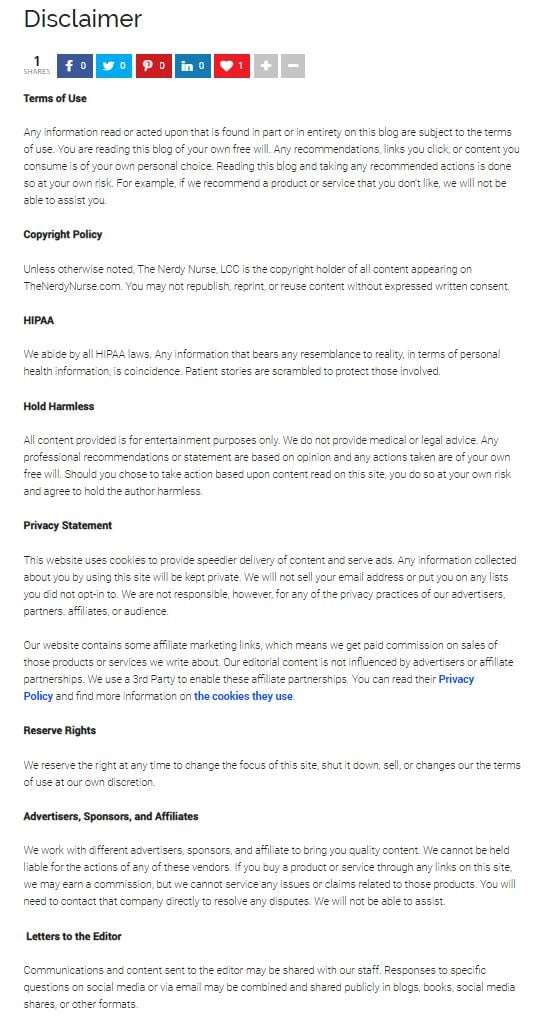
14. Dr. Mike Sevilla
Dr. Mike Sevilla has a much shorter disclaimer that covers fewer topics than other medical blogs; it appears on his contact page. It explains that people should not use his material without permission, that he can’t guarantee the accuracy of the information, and says that the information isn’t intended to create or cure any disease. He also recommends consulting a doctor like most medical blog disclaimer examples. His disclaimer says:
The material on this website is not to be used by any commercial or personal entity without expressed written consent of the blog author. The statements on this blog are not intended to diagnose, treat, cure or prevent any disease. The author does not in any way guarantee or warrant the accuracy, completeness, or usefulness of any message and will not be held responsible for the content of any message. Always consult your personal physician for specific medical advice.
15. Pulsus
The disclaimer in Pulsus isn’t labeled as much. It’s under an author bio that outlines the writer’s medical experience and current job. Her disclaimer says that the blog represents her personal opinions and not those of any workplace she ever has been or will be at. It also recommends that people seek out a medical opinion from their doctor rather than relying on the information in her blog.
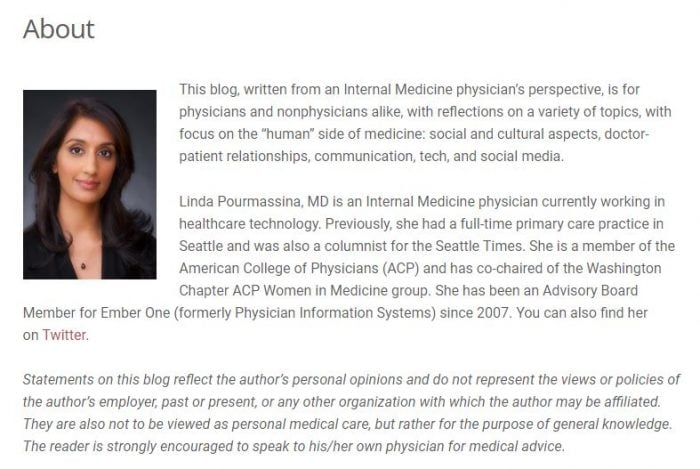
Diet Blog Disclaimers
Diet blog disclaimers are like medical blogs in that they dispense information about health but they’re different in that they’re usually written by people without specific medical knowledge. Many of them follow a person’s journey to weight loss. Some include disclaimers saying that they aren’t sharing medical information and that people should consult professionals.
16. No Thanks to Cake
No Thanks to Cake chronicles the weight loss journey of its author and shares recipes and information about the emotional effects of weight loss. Her disclaimer reminds readers that she’s not a medical professional and that she’s sharing her story and trying to entertain people. She also says that people should consult a professional if they want a professional opinion.
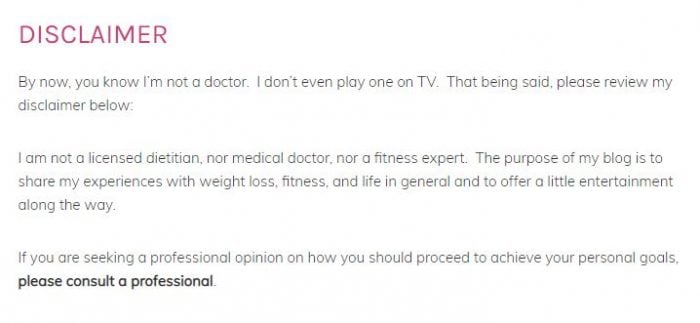
17. The Fitnessista
The Fitnessista features a woman with a series of certifications. She’s a certified personal trainer, weight loss specialist, and licensed for Zumba, among other things. Her disclaimer is short and reminds people that she’s not a medical professional. It says:
Disclaimer: I am not a medical doctor or Registered Dietitian. The information presented is purely to share my experience and for entertainment purposes. As always, check with a doctor before making any fitness or nutrition changes. The author and blog disclaim liability for any damage, mishap, or injury that may occur from engaging in any activities or ideas from this site.
18. Strong Chicks Rock
Strong Chicks Rock includes the blog disclaimer on the footer of the site. She reminds people that she’s not running a medical organization and that she’s not issuing advice to readers. She also says that people should consult a doctor before beginning to lose weight.
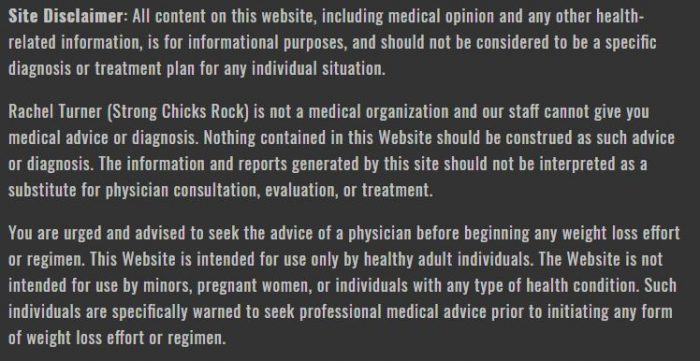
19. Carrots ‘N’ Cake
Carrots ‘N’ Cake includes a disclaimer that asks people not to use the site if they don’t accept it. Like other weight loss and diet blogs, it reminds people that she’s not following a medically-prescribed diet and recommends that people see a doctor before starting their own plan. She also includes an FTC Disclosure, Affiliate Links, and Comment Policy in the disclaimer. It says:
By using this website, you accept this disclaimer in full. If you disagree with any part of this disclaimer, please do not use CarrotsNCake.com or any affiliated websites or companies. I reserve the right to modify these terms at any time, so please check back periodically for any changes.
All information and resources found on CarrotsNCake.com are based on the opinions of the author (unless otherwise noted). All information is intended to motivate readers to make their own health, nutrition, and fitness decisions after consulting with their health care provider. My macro plans are not medically-prescribed diets. The focus is meal prep education and recipe ideas.
I encourage you to consult a doctor before making any health or diet changes, especially any changes related to a specific diagnosis or condition. NO information on this website should be used to diagnose, treat, prevent, or cure any disease or condition.
FTC Disclosure
The FTC requires bloggers to disclose whenever there is a financial interest or bias related to a recommendation or when a blogger’s opinion may be financially motivated in any way. I always want to be transparent and honest with my readers and how I make money from this website, so I will always disclose this information.
Affiliate Links
The FTC also requires disclosure about any affiliate links. I specifically note at the bottom of a blog post when affiliate links are present. This means that I will earn a small commission from the company if you decide to purchase the product linked to.
Comment Policy
I try my hardest to be kind, respectful, and transparent on CarrotsNCake.com and ask the same respect from readers. For this reason, rude, offensive, or harmful comments will not be tolerated. You are welcome to disagree, but just do it nicely!
20. Comeback Momma
Comeback Momma has a disclosure page where the author reminds readers that the blog is personal; it’s both written and edited by her. She explains her sponsorships, says that there are no conflicts of interest, and says that the blog operates on word of mouth marketing standards. It also includes information on how the blog uses ads.
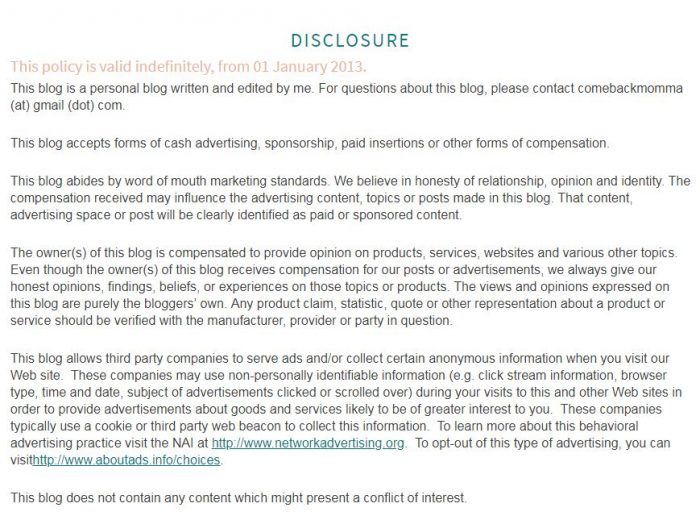
Lifestyle Blog Disclaimer
Lifestyle blog disclaimers vary greatly in length and content. Each blogger has to decide whether they want to inform people about how they earn money, about their qualifications, and what their data policy is. They’re usually less intense than disclaimers on professional blogs because people aren’t looking for something like legal information or medical information.
21. Julie Blanner
Julie Blanner includes a short disclaimer on her page that discusses how she got into blogging and her background. It’s just a quick note saying that she uses affiliate links and paid advertising. Like many lifestyle blogs, it’s short and to the point

22. Thirteen Thoughts
The disclaimer for Thirteen Thoughts is on the “Disclosure” page. It explains that everything provided on the site is for general informational purposes and that it’s published in good faith. The site includes a variety of disclaimers, including a professional disclaimer that says she doesn’t provide mental health advice and an affiliates disclaimer that lets readers know the links are affiliate links. It says:
WEBSITE DISCLAIMER
The information provided by Thirteen Thoughts (“we,” “us” or “our”) on https://www.thirteenthoughts.com (the “Site”) is for general informational purposes only. All information on the Site is provided in good faith, however, we make no representation or warranty of any kind, express or implied, regarding the accuracy, adequacy, validity, reliability, availability or completeness of any information on the Site. UNDER NO CIRCUMSTANCE SHALL WE HAVE ANY LIABILITY TO YOU FOR ANY LOSS OR DAMAGE OF ANY KIND INCURRED AS A RESULT OF THE USE OF THE SITE OR RELIANCE ON ANY INFORMATION PROVIDED ON THE SITE. YOUR USE OF THE SITE AND YOUR RELIANCE ON ANY INFORMATION ON THE SITE IS SOLELY AT YOUR OWN RISK.
EXTERNAL LINKS DISCLAIMER
The Site may contain (or you may be sent through the Site) links to other websites or content belonging to or originating from third parties or links to websites and features in banners or other advertising. Such external links are not investigated, monitored, or checked for accuracy, adequacy, validity, reliability, availability or completeness by us. WE DO NOT WARRANT, ENDORSE, GUARANTEE, OR ASSUME RESPONSIBILITY FOR THE ACCURACY OR RELIABILITY OF ANY INFORMATION OFFERED BY THIRDPARTY WEBSITES LINKED THROUGH THE SITE OR ANY WEBSITE OR FEATURE LINKED IN ANY BANNER OR OTHER ADVERTISING. WE WILL NOT BE A PARTY TO OR IN ANY WAY BE RESPONSIBLE FOR MONITORING ANY TRANSACTION BETWEEN YOU AND THIRDPARTY PROVIDERS OF PRODUCTS OR SERVICES.
PROFESSIONAL DISCLAIMER
The Site cannot and does not contain medical or mental health advice. The medical mental health information is provided for general informational and educational purposes only and is not a substitute for professional advice. Accordingly, before taking any actions based upon such information, we encourage you to consult with the appropriate professionals. We do not provide any kind of medical or mental health advice, other than those based on personal experience. THE USE OR RELIANCE OF ANY INFORMATION CONTAINED ON THIS SITE IS SOLELY AT YOUR OWN RISK.
AFFILIATES DISCLAIMER
The Site may contain links to affiliate websites, and we receive an affiliate commission for any purchases made by you on the affiliate website using such links. Our affiliates include the following:
Awin (Affiliate Window)
CJ Affiliate by Conversant
Rakuten Affiliate Network
ShareASale
We are a participant in the Amazon Services LLC Associates Program, an affiliate advertising program designed to provide a means for us to earn advertising fees by linking to Amazon.com and affiliated websites.
TESTIMONIALS/REVIEWS DISCLAIMER
The Site may contain testimonials or reviews. These testimonials reflect the real life experiences and opinions of such users. However, the experiences are personal to those particular users, and may not necessarily be representative of all users of our products and/or services. We do not claim, and you should not assume, that all users will have the same experiences.
23. Island Living 365
Island Living 365 has a page that includes the about, terms and conditions, and privacy policy. The disclaimer is short and only lets people know about affiliate links.

24. The Chalkboard
The Chalkboard keeps its disclaimer on the contact page. The disclaimer recommends contacting a doctor if you have a question regarding your health. It also warns that the information is not meant to address any issues readers have with disease. It says:
The Chalkboard Mag and its materials are not intended to treat, diagnose, cure or prevent any disease. All material on The Chalkboard Mag is provided for educational purposes only. Always seek the advice of your physician or another qualified healthcare provider for any questions you have regarding a medical condition, and before undertaking any diet, exercise or other health-related programs.
25. The Barefoot Blonde
The Barefoot Blonde has a popup that appears and blurs the rest of the screen that includes the disclaimer. It also links to a longer page with more and more specific information. For example, the pop-up includes the privacy policy and discloses the affiliate advertising. The page itself explains the data policy, how the data is used, and the site’s social media affiliations.
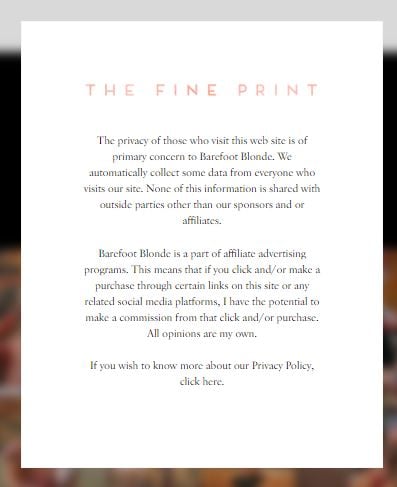
Other Blog Disclaimer Examples
There are many other types of blogs that use disclaimers. From niche business blogs to travel or home improvement blogs, every blog has different needs in its disclaimer. Many explain that they can’t guarantee the accuracy of the information. It’s also common for blogs to remind readers that they can’t guarantee access to the site at all times.
26. Gary Vaynerchuk
Gary Vaynerchuk is famous for several ventures, including Wine Library TV. He’s the chairman of VaynerX and CeO of VaynerMedia. His blog features its disclaimer on the “Terms of Use” page and explains that the material is available “as is”. He offers no warranties and says that you aren’t guaranteed access to the site.
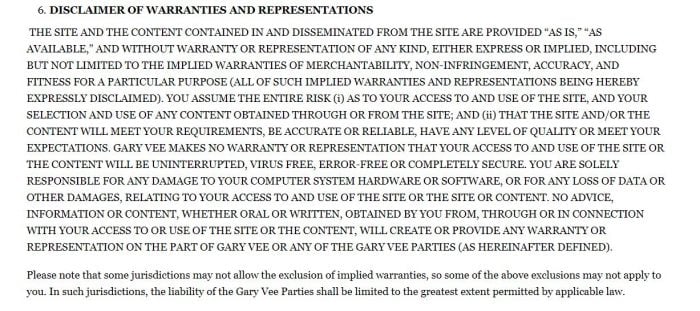
27. The Blonde Abroad
The Blonde Abroad has its disclaimer on a page labeled “Disclosure Policy”. It explains that it’s a personal blog, that they take money for a variety of things, and that it uses word of mouth marketing standards. It also reassures readers that even though she takes money, her opinions are still her own. It says:
This blog is a personal blog written and edited by Kiersten Rich. For questions about this blog, please email Contact at The Blonde Abroad dot com.
This blog accepts forms of cash advertising, sponsorship, paid insertions or other forms of compensation.
This blog abides by word of mouth marketing standards. We believe in honesty of relationship, opinion and identity. The compensation received may influence the advertising content, topics or posts made in this blog. That content, advertising space or post will be clearly identified as paid or sponsored content.
The owner(s) of this blog may be compensated to provide opinion on products, services, websites and various other topics. Even though the owner(s) of this blog receives compensation for our posts or advertisements, we always give our honest opinions, findings, beliefs, or experiences on those topics or products. The views and opinions expressed on this blog are purely the bloggers’ own. Any product claim, statistic, quote or other representation about a product or service should be verified with the manufacturer, provider or party in question.
This blog does not contain any content which might present a conflict of interest.
28. Positively Present
Positively Present offers a link to its “Terms of Use” page from the footer of the blog. It breaks up its points into subheadings. It explains that they aren’t offering professional advice and can’t guarantee the accuracy of the information provided. Presenting the information in bite size chunks makes it easier for readers to understand the disclaimer.
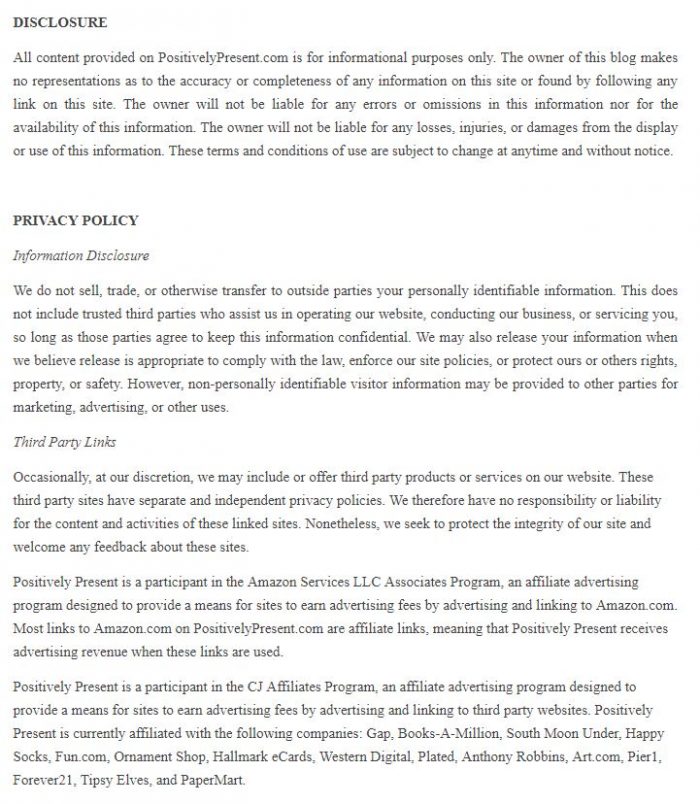
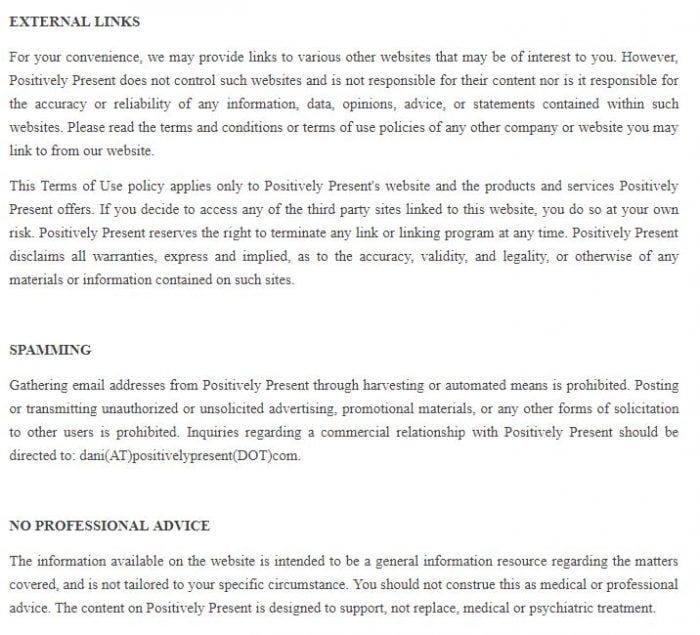
29. Young House Love
Young House Love includes a link to its disclaimer on the footer, like many different types of blog. They explain that they aren’t experts and that the blog is used to make a profit. It also says that they can change the site at any time and offers to let people use a couple as long as they’re properly attributed. The blog disclaimer sample says:
We’re laying down all the ins & outs of Young House Love with a bit of legalese sprinkled in for good measure. Please let us know if you have any additional questions.
Young House Love LLC is created and written solely by Sherry and John Petersik who aren’t experts, just two happy homeowners who share their house-related trials and triumphs. The various home improvement & decorating methods, suggestions, and tutorials on Young House Love are not error proof, they’re merely what work for Sherry and John along the way. Extra precautions and additional research are always advised and Young House Love cannot be held responsible for your personal safety or the outcome of your home improvement undertakings.
Young House Love is a for profit blog. It contains paid banner advertisements that are generated and managed by a third party network. This site also includes relevant affiliate links through Amazon or RewardStyle (both in the content and on the sidebar) all of which we do our best to clearly mark as such. If you click on an affiliate link and make a purchase, we may receive a small commission. This does NOT result in any additional cost to you, and the affiliate money we earn helps pay the fees to keep this site up and running – thanks for your support! Freebies or special blogger discounts are not accepted, and none of the posts are ever sponsored. That has been the policy since the end of 2010, and you can read more about that here.
Young House Love reserves the right to remove, replace, or move any images or content without prior announcement (site redesigns usually occur every few years). All photos that aren’t taken by Young House Love are credited and linked to their outside sources and are believed to be in public domain and readily available on the Internet (published according to the U.S. Copyright Fair Use Act, title 17, U.S. Code). Any photos not credited to an outside source have been taken by Young House Love and are rights protected. Failure to link back and credit our site as their source constitutes a copyright violation.
Feel free to use an image or two from Young House Love as long as they’re credited and accompanied by a link back to this site. Using YHL photos in bulk, even with a credit, is prohibited (be it for the purposes of a photo gallery, landing page, roundup, series of posts, or any other feature that duplicates a large portion of content). Please contact YHL for express permission if you’d like to use more than a few photos. Duplicating any of this site’s text (even if it’s credited to YHL) is strictly prohibited. Please paraphrase, summarize, or link to copy instead of cutting and pasting it. The design and layout of Young House Love is the sole property of Sherry and John Petersik.
PRIVACY POLICY: Young House Love never sells or provides any of your contact information to outside companies. YHL does use third-party advertising companies to serve ads when you visit this site. These companies may use aggregated information (not including your name, address, email address, or telephone number) about your visits to this and other sites in order to provide advertisements about goods and services that may be of interest to you. If you’d like more information about this practice or to opt out, please click here.
Did your eyes glaze over? Ours too. But now that we have that out of the way, we hope you enjoy probing every other nook and cranny of our site!
30. AutoBlog
AutoBlog has an entire legal section that a reader can reach from the footer. It explains that the company behind the blog makes no promises about its content or information. Like other blogs, it says that everything in it is provided as is. They also remind readers that data shared over the Internet may not be secure.
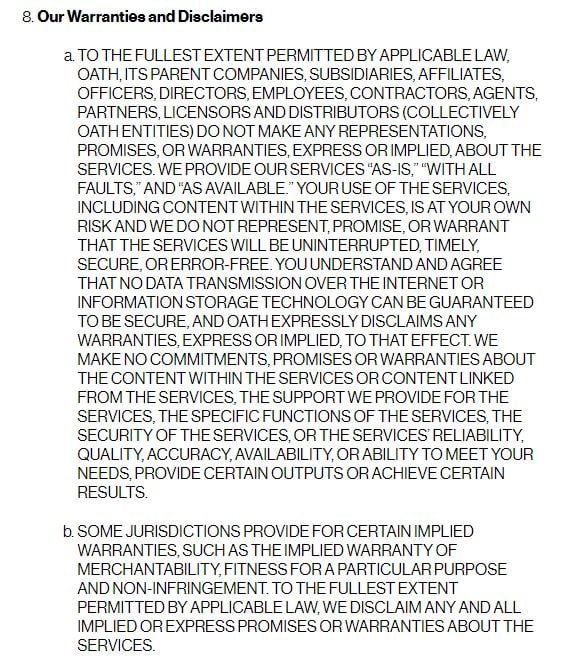
Keep in mind that when you ask what is a blog disclaimer, these are only a few places to take inspiration from. Look at your favorite blogs, bloggers you admire, and sites you follow to see whether they have tips to help you develop your own disclaimers. Just remember that when you’re offering information that could lead to legal or medical consequences, it’s even more important to be specific and remind people that you aren’t their personal doctor, lawyer, or therapist. Even if you’re qualified and do the work in real life, it’s important for readers to understand they aren’t your clients.
So what is a blog disclaimer? It’s a page on your site that protects you from legal liability with the content your publish.
Adding a disclaimer to your blog could give you some legal protection against issues that may arise. It’s definitely a step to consider if you don’t have one yet. As you can see, blog disclaimers vary greatly from blog to blog. You can write and publish one that works for both the protection you need and the spirit of your site.

